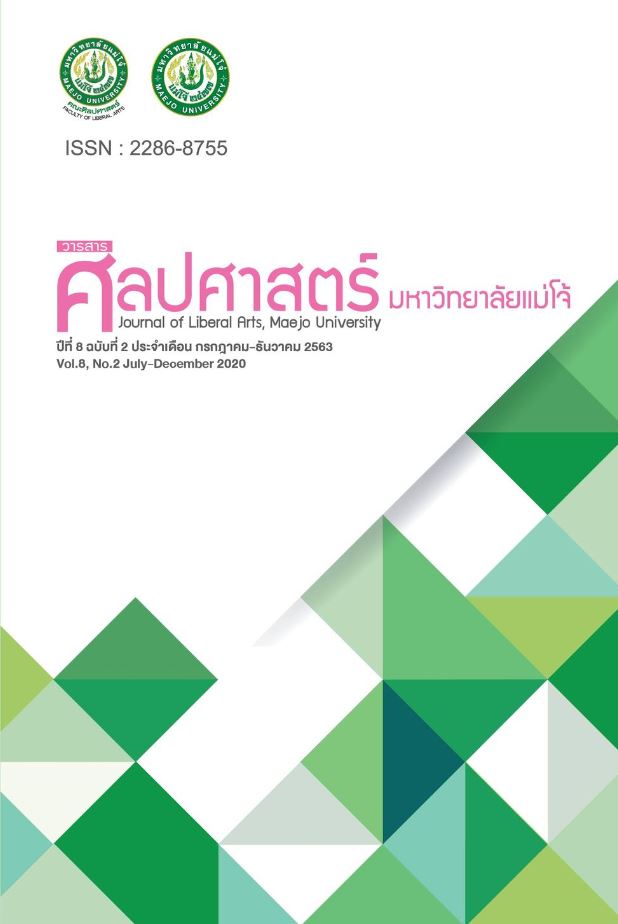Factors Affecting the Relationship between Education Budget and Human Capital that affects Gross Domestic Product (GDP)
Main Article Content
Abstract
The purpose of this research is to study the influence of education budget and human capital that affect national income. And to create equations for forecasting, education budgets, and human capital that affect national income It is a descriptive research from secondary data, which uses tools such as data record forms to collect data such as Education budget, labor force, capacity development of labor and national income during the year 2006-2018 for quantitative analysis to find the relationship based on the hypothesis and to determine the complex regression equation using the least squares method according to the Cobb-Douglas production function concept. And create an equation model for forecasting, the results show that changes in education budgets (EB), labor force (LF), and capacity development (CDL) have a significant effect on 0.01 national income, which is based on research assumptions. For complex regression equations, it was found that the factors of education budget and human capital had significant effect on national income at the level of 0.01 together with the model obtained from the research as follows: These have the power to explain 96.20 percent, with a standard deviation of ± .178 in forecasting equation regression complexes. For the forecast as follows: Y = -74083656.4 + 1.597 CDL + .043 EB + .264 LF
Article Details
References
กระทรวงแรงงาน. (2561). สถิติแรงงานประจำปี 2561. กรุงเทพฯ : รายงานประจำปี สำนักงานปลัดกระทรวงแรงงาน.
กัลย์ ปิ่นเกสร, เฉลิมชัย กิตติศักดิ์นาวิน และจิราวรรณ คงคล้าย. (2560). ทุนมนุษย์ : ตัวชี้วัดทุนมนุษย์ระดับองค์การ. วารสารบัณฑิตศึกษา มหาวิทยาลยัราชภัฏวไลยอลงกรณ์ ในพระบรมราชูปถัมภ์. ปีที่ 11 ฉบับที่ 2 พฤษภาคม – สิงหาคม 2560. (น. 193-202)
จีระ ประทีป. (2553). เอกสารประกอบการสอนชุดวิชา 33410 การพัฒนาทรัพยากรมนุษย์ หน่วยที่ 2 ทุนมนุษย์ และการจัดการทุนมนุษย์. (พิมพ์ครั้งที่ 2). นนทบุรี: มหาวิทยาลัยสุโขทัยธรรมาธิราช, สาขาวิชาวิทยาการจัดการ.
เฉลิมพงศ์ มีสมนัย. (2560). การบริหารรายจ่ายของรัฐบาลและระบบงบประมาณ. สืบค้น 4 กันยายน 2562. จาก http://sms.stou.ac.th /index.php?p=2608.
ชัยมงคล สุพรมอินทร์. (2557). งบประมาณรายจ่ายภาครัฐกับการศึกษาไทย : นัยสำคัญบางประการทางการคลัง ว่าด้วยการจัดสรรงบประมาณเพื่อพัฒนาคุณภาพการศึกษาไทย. วารสารวิจัยและพัฒนา มหาวิทยาลัยราชภัฏสวนสุนันทา. 6 (1), 81-99.
ธเนส เตชะเสน และพลวัฒน์ ชุมสุข. (2560). ทุนมนุษย์ในทางเศรษฐศาสตร์เชิงพุทธ. วารสารมหาจุฬาวิชาการ. 3 (2), 119-137.
ประไพทิพย์ ลือพงษ์. (2555). การพัฒนาทุนมนุษย์ให้มีสมรรถนะความสามารถในการแข่งขัน. วารสารนักบริหาร.
32 (4), 103-108.
ปราชญา กล้าผจัญ และพอตา บุตรสุทธิวงศ์. (2550). การบริหารทรัพยากรมนุษย์. กรุงเทพฯ: ก. พลการพิมพ์ (1996) จำกัด.
ปิยนันท์ สวัสดิ์ศฤงฆาร. (2552). ทุนมนุษย์กับการพัฒนาทรัพยากรมนุษย์แนวคิดใหม่. จาก http: //www. oknation.net/blog/print.php?id=462489. สืบค้นวันที่ 15 พฤศจิกายน 2555.
วิทยากร เชียงกูล. (2550). แนวทางการพัฒนาเศรษฐกิจสังคมเพื่อประสิทธิภาพ เป็นธรรม และยั่งยืน. จาก https://witayakornclub.wordpress.com. สืบค้นเมื่อวันที่ 4 กันยายน 2562.
ศิริวรรณ แก้วจันดา. (2560). งบประมาณและความหมาย. สืบค้น 4 กันยายน 2562. จาก https://www. gotoknow.org/posts/454366.
สำนักงานสภาพัฒนาการเศรษฐกิจและสังคมแห่งชาติ. (2562). รายงานผลการพัฒนาประเทศในรอบ 5 ปี(พ.ศ. 2557 – พ.ศ. 2561). สืบค้น 3 กันยายน 2562. จาก https://www.nesdb.go.th/ewt_ news.php?nid= 8639& filename=index.
สำนักงานงบประมาณ. (2562). งบประมาณโดยสังเขป ประจำปีงบประมาณ พ.ศ. 2535-2562. กรุงเทพฯ : สำนักงบประมาณ.
สำนักงานสถิติแห่งชาติ. (2562). ผลิตภัณฑ์มวลรวมประชาชาติ. สืบค้น 14 มีนาคม 2563. จาก http://statbbi.nso.go.th /staticreport/page/sector/th/index.aspx.
สำนักงานสถิติแห่งชาติ. (2562). ความต้องการพัฒนาขีดความสามารถ. สืบค้น 14 มีนาคม 2563. จาก http:// service. nso.go.th/nso/web/statseries/statseries07.html.
สุวรรณี คำมั่น และคณะ. (2551). ทุนสังคมกับการพัฒนาทุนมนุษย์. สืบค้น 3 กันยายน 2562.จาก https:// bordeure. wordpress.com.
อโนทัย ตรีวานิช. (2552). สถิติธุรกิจ. ขอนแก่น: สำนักพิมพ์ ขอนแก่นการพิมพ์.
Belton Fleisher, Haizheng Li and Min Qiang Zhao. (2010). Human capital, economic growth, and regional inequality in China. Journal of Development Economics. Volume 92, Issue 2, July 2010. (pp. 215-231).
D Asteriou and G.MAgiomirgianakis. (2001). Human capital and economic growth: Time series evidence from Greece. Journal of Policy Modeling. Volume 23, Issue 5, July 2001. (pp. 481-489).
Elena Pelinescu. (2015). The Impact of Human Capital on Economic Growth. Procedia Economics and Finance Journal. Volume 22, 2015. (pp. 184-190).
Nicholson, W. (1985). Microeconomic Theory. Japan: CBS College.

